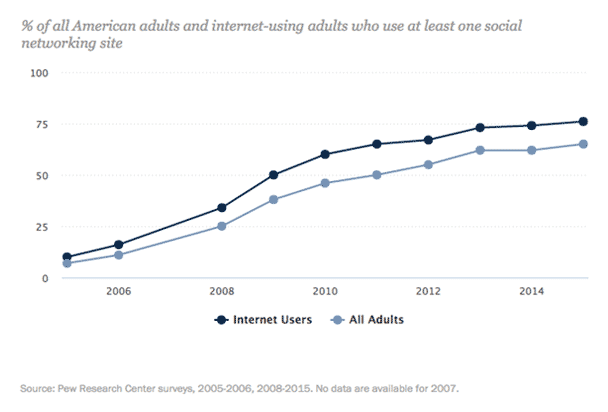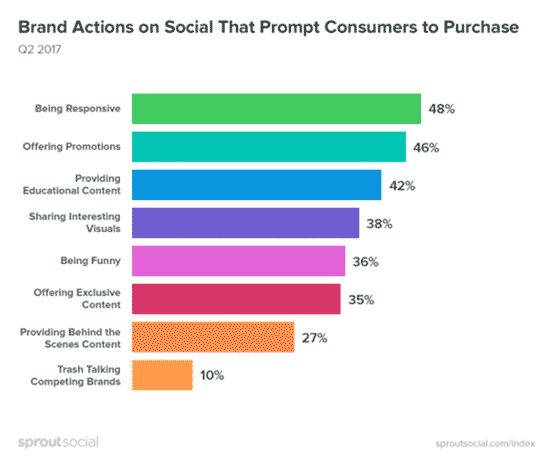Why Social Media is Increasingly Important for eCommerce Marketing
Many brands have already demonstrated an understanding of the hard advertising power that social media channels provide. With more and more shoppers looking to their social feeds for inspiration and honest reviews of their next online purchases, there is a strong argument for eCommerce marketers to provide soft visibility for their brands too. As social research becomes increasingly important for consumers when choosing a product to purchase, this blog looks at why it is essential for businesses to harness the clout that these channels offer in their eCommerce marketing plans.

The rise of social media marketing
88% of businesses who employ more than 100 staff using Twitter for marketing purposes
According to figures from Pew Research Centre, in 2005 only 5% of adults in America used a social media platform. As of this year (2018), the figure has risen to almost 70% of the public that have at least one profile on one of these platforms. Companies are following close behind with 88% of businesses who employ more than 100 staff using Twitter for marketing purposes (Statusbrew, 2017) and ad spend on Instagram Stories increasing 220% year-on-year (Our Social Times, 2018).

A whole new world
It’s easy to see why they’re making the move too.
Unlike “one way” print, radio and televised promotions, social platforms provide companies with a whole new level of access to their existing and potential customer base. Alongside text, image and video ads, they can speak directly with their audiences. Whether those audiences are consumers, competitors or peer brands and possibly more importantly, their audience are able to interact with them through direct messages, likes, comments and reviews.

This interactivity is incredibly valuable to brands and can provide much larger reach than traditional outlets can compete with. Couple this potential for valuable interactivity with the measurable engagement of brand PR on a granular level and you can see why companies are moving their marketing efforts to social platforms. However, it does also leave companies more open to negative public opinions, which is why it is so important to manage these platforms delicately and professionally.
Take video marketing as an example, many companies have already entered this sphere and most of those who aren’t, plan to soon. They have good reason to do so; 72% of people will watch a video to learn about a product or service rather than read the text when both options are available on the same page. Nevertheless, 51% of people have a lower opinion of brands that use autoplaying video ads. (HubSpot, 2016) (Source: https://www.hubspot.com/marketing-statistics), so you have to be careful with the way that you use these tools.
Hard and Fast: Social Media Advertising
The quickest way to reach your audience on social media is through paid ads, but where should you go first? The answer is of course where your audience is most likely to be, for which you will need to know who they are (most importantly their age and gender) and then choose a platform based on this. In addition to this analysis, consider which of your channels are performing well organically and prioritise these as well. You can find an awesome, detailed breakdown in this blog from informatics on which social-media platform will work best your audience for more information.
So, how do you know what content is going to hit the mark and what will put your users off for good?
Increasing your social media conversion rates is a whole other post, but for those just starting out there are some basic rules to follow for a successful foray into social advertising.
- Make sure the pages you wish to drive traffic to are user and mobile friendly. Otherwise you will be wasting your advertising budget and negatively affecting your brand image.
- Focus your targeting on your core audience; market make up to beauty addicts and restaurants to foodies.
- Identify your brand tone that resonates with your business and stick to it. Make sure that this also aligns with your platform. Snapchat is more fun than say, LinkedIn.
- Keep your ads consistent so that users come to be familiar with your brand imagery.
Soft and Gradual: Organic Social Media Visibility
Just as important as utilising social media to promote their products, eCommerce companies must actively manage their presence and engage in conversations, positive and negative, on social media to ensure that they are present when users are researching on social. The brands that do best on social media have worked just as hard on their soft presence, building trust with their customers as they have at hard marketing and to be successful you will need to do this too. Here are some examples of brands killing the soft, honest side of brand promotion:
"One more episode" - You, lying straight to your own face.
— Netflix ANZ (@NetflixANZ) 5 August 2017
You're crying? We're crying. So sweet! 💚 https://t.co/ccUDRoGauF
— Starbucks Coffee (@Starbucks) September 4, 2018
What color tie should we burn in tribute to the business gods before our next boardroom meeting? https://t.co/wxYu1nZ8KH
— Old Spice (@OldSpice) August 14, 2018
Ground Rules:
- Nurture your relationships - As Sprout Social puts it, “don’t leave the ‘social’ out of your social media presence”. A smaller, engaged following wins out over a large passive audience every time.
- Be sociable – and not just outwardly, your priority when it comes to social should be responding rapidly to incoming comms whether positive or negative. This will make those commenting feel listened to and reassure new audiences that if they have something to say, you will get back to them too.
- Show your personality - it turns out people aren’t won over by robotic professional content and prefer the human approach. Go figure!
- Help your audience - entertain and make them laugh more than you sell to them. This way they’ll be more open when you do self-promote.
- Invite them to engage – through optimising your channels and offline efforts. Provide hashtags and handles, people like to feel involved you just need to make it easy!

Conclusion
Social media is undeniably becoming one of the most important channels for brand advertising and engagement, providing opportunities to interact with audiences in a more dynamic way. A successful social campaign can create a positive impression of a brand that encourages customers to trust in them and their product offering. The tips we have covered here should give you a decent place to start but if you need further advice our social media consulting services are always on hand to give you the help you need to succeed.
Follow my contributions to the blog to find out more about how to make Search Marketing work for you, or sign up to the ThoughtShift Guest List, our monthly email, to keep up-to-date on all our blogposts, guides and events.
